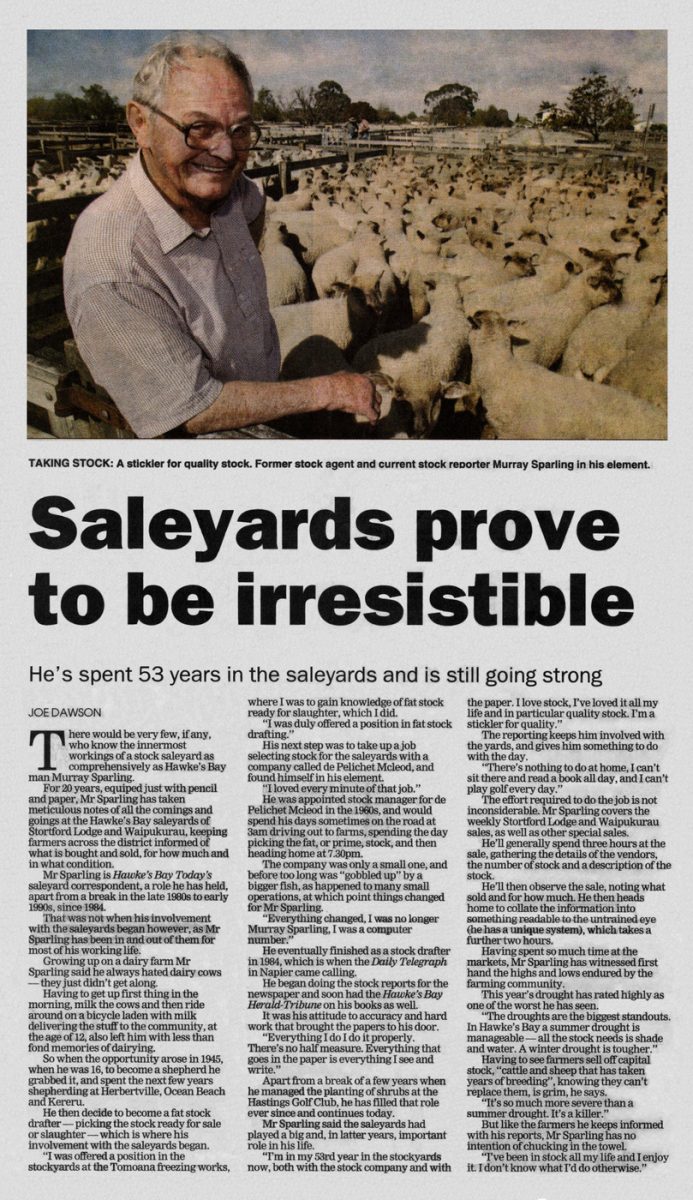Saleyards prove to be irresistible
He’s spent 53 years in the saleyards and is still going strong
JOE DAWSON
There would be very few, if any, who know the innermost workings of a stock saleyard as comprehensively as Hawke’s Bay man Murray Sparling.
For 20 years, equiped [equipped] just with pencil and paper, Mr Sparling has taken meticulous notes of all the comings and goings at the Hawke’s Bay saleyards of Stortford Lodge and Waipukurau, keeping farmers across the district informed of what is bought and sold, for how much and in what condition.
Mr Sparling is Hawke’s Bay Today’s saleyard correspondent, a role he has held, apart from a break in the late 1980s to early 1990s, since 1984.
That was not when his involvement with the saleyards began however, as Mr Sparling has been in and out of them for most of his working life.
Growing up on a dairy farm Mr Sparling said he always hated dairy cows – they just didn’t get along.
Having to get up first thing in the morning, milk the cows and then ride around on a bicycle laden with milk delivering the stuff to the community, at the age of 12, also left him with less than fond memories of dairying.
So when the opportunity arose in 1945, when he was 16, to become a shepherd he grabbed it, and spent the next few years shepherding at Herbertville, Ocean Beach and Kereru.
He then decide [decided] to become a fat stock drafter – picking the stock ready for sale or slaughter – which is where his involvement with the saleyards began.
“I was offered a position in the stockyards at the Tomoana freezing works, where I was to gain knowledge of fat stock ready for slaughter, which I did.
“I was duly offered a position in fat stock drafting.”
His next step was to take up a job selecting stock for the saleyards with a company called de Pelichet Mcleod, and found himself in his element.
“I loved every minute of that job.”
He was appointed stock manager for de Pelichet Mcleod in the 1960s, and would spend his days sometimes on the road at 3am driving out to farms, spending the day picking the fat, or prime, stock, and then heading home at 7.30pm.
The company was only a small one, and before too long was “gobbled up” by a bigger fish, as happened to many small operations, at which point things changed for Mr Sparling.
“Everything changed, I was no longer Murray Sparling, I was a computer number.”
He eventually finished as a stock drafter in 1984, which is when the Daily Telegraph in Napier came calling.
He began doing the stock reports for the newspaper and soon had the Hawke’s Bay Herald-Tribune on his books as well.
It was his attitude to accuracy and hard work that brought the papers to his door.
“Everything I do I do it properly. There’s no half measure. Everything that goes in the paper is everything I see and write.”
Apart from a break of a few years when he managed the planting of shrubs at the Hastings Golf Club, he has filled that role ever since and continues today.
Mr Sparling said the saleyards had played a big and, in latter years, important role in his life.
“I’m in my 53rd year in the stockyards now, both with the stock company and with the paper. I love stock, I’ve loved it all my life and in particular quality stock. I’m a stickler for quality.”
The reporting keeps him involved with the yards, and gives him something to do with the day.
“There’s nothing to do at home, I can’t sit there and read a book all day, and I can’t play golf every day.”
The effort required to do the job is not inconsiderable. Mr Sparling covers the weekly Stortford Lodge and Waipukurau sales, as well as other special sales.
He’ll generally spend three hours at the sale, gathering the details of the vendors, the number of stock and a description of the stock.
He’ll then observe the sale, noting what sold and for how much. He then heads home to collate the information into something readable to the untrained eye (he has a unique system), which takes a further two hours.
Having spent so much time at the markets, Mr Sparling has witnessed first hand the highs and lows endured by the farming community.
This year’s drought has rated highly as one of the worst he has seen.
“The droughts are the biggest standouts. In Hawke’s Bay a summer drought is manageable – all the stock needs is shade and water. A winter drought is tougher.”
Having to see farmers sell off capital stock, “cattle and sheep that has taken years of breeding”, knowing they can’t replace them, is grim, he says.
“It’s so much more severe than a summer drought. It’s a killer.”
But like the farmers he keeps informed with his reports, Mr Sparling has no intention of chucking in the towel.
“I’ve been in stock all my life and enjoy it. I don’t know what I’d do otherwise.”
Photo caption –
TAKING STOCK: A stickler for quality stock. Former stock agent and current stock reporter Murray Sparling in his element.












Do you know something about this record?
Please note we cannot verify the accuracy of any information posted by the community.